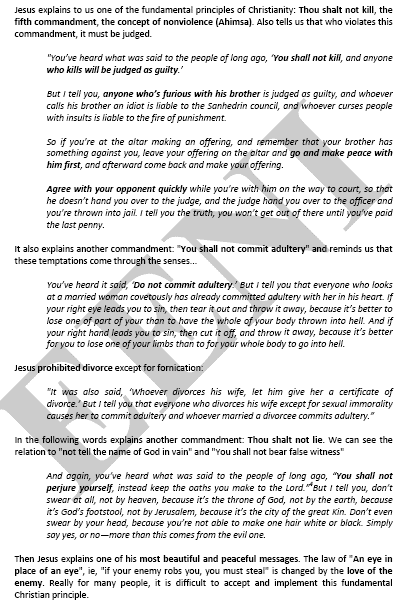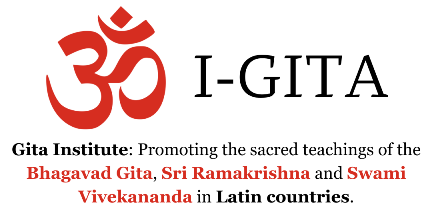Christianity: Sermon on the Mount. Golden Rule

Pillar of the Christian Ethics (Sermon on the Mount) Jesus talks about peace, justice
- The Sermon on the Mount as the pillar of the Christian Ethics
- Christian Golden Rule
- Influence of the Sermon on the Mount on Leo Tolstoy, Martin Luther King, and Mahatma Gandhi

The Subject “Christianity: Sermon on the Mount” belongs to the following Online Programs taught by EENI Global Business School:
Doctorate: Ethics, Religion & Business, African Business.
Course: Christianity & Business.

Masters: Religions & Business, International Business.
Languages:  or
or  Sermón Montaña
Sermón Montaña  Sermon sur la montagne.
Sermon sur la montagne.

“You have heard what has said to the people of long ago, ‘You shall not kill, and anyone who kills will be judged as guilty’.”
The Sermon on the Mount (Gospel of Matthew), as the Ten Commandments, is fundamental to understand Christianity. In this sermon; we find the Lord's Prayer or the Golden Rule of Jesus. It is interesting to point out the huge similarity to the teachings of Buddha (“The light of the body is the eye”).
As we can see Jesus talks about peace, forgiveness, and justice.
“Blessed are meek (Pacific), those who hunger and thirst for righteousness, the merciful, the pure in heart, and the peacemakers.”
These opening words are heart warming: peacemakers, justice, merciful, meek, those who mourn. To all of them Jesus addresses. Then Jesus explains that he has come to enforce the law and does not invalidate the previous laws. Jesus demands everyone to seek justice:
“Don’t think I came to abolish the law or the prophets; I did not come to abolish them, but to fulfill them”
Jesus explains to us one of the fundamental principles of Christianity: Thou shall not kill, the fifth commandment, the concept of the Non-Violence (Ahimsa). Also, tells us that who violates this commandment; he must be judged.
Then Jesus explains one of his most beautiful and peaceful messages. The law of “An eye in place of an eye,” i.e., “if your enemy steal you, you must steal” is changed by the love to the enemy. Really for many people; it is hard to accept and implement this fundamental Christian principle.
“Whoever slaps you on the right cheek, turn the other cheek to him as well...
... Love your enemies and pray for those who persecute you.”
In the Ten Commandments; we cannot find anything related to charity. In Islam (the Zakat is one of the five pillars), in Hinduism, Sikhism or Jainism charity is a key point of its doctrines.
In this beautiful sermon, Jesus talks us about the almsgiving and tells us that we should do it anonymously and a fair way, else we would be hypocrites.
“Be careful not to do your good deeds in front of people. When you give to the poor, don’t trumpet this before others like the hypocrites do.”
The need for the detachment from the material, highly developed in the Asian religions; it is not part of the ten commandments, but Jesus tells us that we should avoid earthly possessions, which are sources of problems.
Don’t store up wealth for yourselves here on earth. Instead, store up wealth for yourselves in heaven.”
There is a reflection of Jesus on the birds (“Aren’t you worth more than them?”) which can lead to misunderstandings and together with the famous passage in the Genesis discussed above, can result in misunderstandings about the need that man dominates to all the species on the Earth.
Some Christians interpret it literally, and others do not. In any case, this principle is radically contrary to the principle of the Non-Violence whose maximum expression is found in the Jain vision of Ahimsa.
Jesus also tells us that nature is developed by itself, does not need the human intervention, a principle fully agrees with Taoism (The Wu Wei Principle).
Jesus says that “Don’t judge others, and you will not be judged,” we must first be able to judge ourselves. This principle also coincides with Taoism and Confucianism.
“Your world will be your criteria for judging the others” Tao XLIV
In the Sermon on the Mount we find the universal golden rule applied to Christianity explained in a positive version:
“Whatever you want people to do to you, do to them too, for in this the Law and the Prophets are summed up.”
As discussed in the subject on Confucianism, Confucius was probably the first to formulate the Golden Rule, one of the principles of the global ethics.
The Sermon on the Mount has influenced many people on the World as Leo Tolstoy (“The Kingdom of God is within you”) Martin Luther King, or Mahatma Gandhi. Furthermore, there are significant similarities with the teachings of Buddha.
“When I read the New Testament and the Sermon on the Mount, I began to understand the teachings of Christianity. With the Sermon on the Mount, I fell in love of Jesus. While there is only one person who goes hungry in the World, Christ is not yet born, and we should keep looking.” Mahatma Gandhi
Sample - Sermon on the Mount

(c) EENI Global Business School (1995-2024)
We do not use cookies
Top of this page




